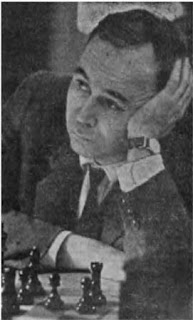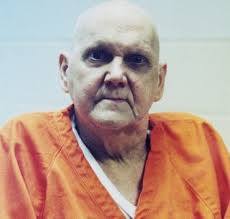Yuri Sakharov (1922 – 1981)
Yuri Nikolaevich Sakharov (Ю́рій Микола́йович Са́харо) was born on September 18, 1922, in Yuzovka (Stalino since 1924, and now Donetsk, Ukraine since 1961). Other sources have him born in the village of Vlasovka, Voronezh Oblast, Russia, over 300 miles away.
His father, Nikolai Matveevich Sakharov (1881 – 1937), was an official in the Donbass mining industry in Ukraine. Yuri was his only child. His mother, Alexandra Afanasievna Yumashev, was a housewife and, later, worked in a sewing factory cutter.
In 1934, Yuri learned how to play chess from his father.
In 1938, Yuri took his first chess lessons from from Apollinary Nikolaevich Gaevsky (1897-1990), a physics and math teacher and strong chess player from Donetsk, Ukraine. He played in the first Ukrainian chess championship, held in Kiev in 1924. He also played in the second Ukranian championship, held in Kharkov in 1925.
In 1938, Sakharov’s father was arrested, proclaimed as “an enemy of the people,” and executed during the Great Purge.
In 1940, Yuri was a student of the Department of Germanic Philology of Donbass State Pedagogical University in Stalino.
In 1940, Yuri, as a son of “an enemy of the people,” was not mobilized to serve in the Red Army. The Soviet enlistment office intended to identify him for flight school, but his enrollment was refused because he was a son of an enemy of the people. Yuri got a job as a handyman in a bakery.
In October 1940, he won the Stalino (Ukraine) Region chess tournament.
In December 1940. He took 13th-15th place in the 12th Ukrainian championship held in Kiev. The event was won by Isaac Bolesvlasky (1919-1977) for the third time in a row. Boleslavsky’s only loss was to Sakharov. [source: Chess in the USSR, No, 3, 1941]
In 1941, Sakharov could not get into the Red Army, but during mobilization he was called to dig trenches.
In October 1941, Stalino was occupied by the Nazis. Yuri decided to work for the Nazis to stay alive. He was sent to a mine camp. About 15,000 Jews were murdered in Stalino from 1941 to 1943.
Yuri became a part of the underground and worked as a translator for the Nazi administration because he knew German.
In 1943, he was arrested and sent Belgium to work as a labor force in the coal mines. He found a way to sneak around at night to play chess for money. He used that money to buy food and shared the food among his compatriots.
In August 1944, when the Allied Forces entered Belgium, Yuri worked with the U.S. Army on various auxiliary jobs. Any Soltis claims that Sakharov fought on the side of the allies and earned a Purple Heart. [source: Soltis, Tal, Petrosian, Spassky and Korchnoi: A Chess Multibiography, 2019, p. 13]
In April 1945, his unit reached the Elbe where the Soviet and Americans met. Yuri wanted to leave on his own and return to Ukraine. He could have stayed with the American troops, but he transferred over to the Soviet forces.
In June 1945, Sakharov was transferred to the Soviet zone of occupation and made it back to Stalino.
In April 1946, Yuri moved to Kiev where he got a job as a sport inspector of the Ukrainian Sport Federation. He was responsible for development of different sport activities, including chess. He helped financially to organize chess clubs at small towns and villages in Ukraine.
In 1946, Yuri got married.
In 1946, he took correspondence courses at Kiev University to complete his degree in Philology.
In 1946, he took 4th-6th place in the Ukraine chess championship. The event was won by Anatoly Bannik (1921-2013).
In 1947, he tied for 1st with Abram Kofman (born in 1909) in the Kiev Chess Championship. [source: Chess in the USSR, No. 6, 1947]
Of interest is that Anatoly (now Natan) Sharanky, a human rights activist and Israeli politician, was born in Stalino, Ukraine on January 20, 1948. He was a child prodigy in chess. At age 15, he won the championship of Donetsk. In 1996, he beat world champion Garry Kasparov in a simultaneous exhibition in Israel.
In 1948 and 1949, Yuri was the chess champion of Kiev. [source: Chess in the USSR, No. 8, 1949]
In 1950, Yuri was expelled from Kiev University for an academic debt.
In 1950, he tied for 1st place in the Quarterfinal of the 19th USSR Chess Championship, held in Tbilisi. [source: Chess in the USSR, No. 3, 1950]
In June 1951, Yuri won the Semi Final of the 19th USSR Chess Championship in Lvov (Lviv) and qualified for the 19th USSR Chess Championship in Moscow. [source: Chess in the USSR, No. 9, 1951]
After the publication of a chess photo in a local newspaper, someone recognized Sakharov as a person who collaborated with German occupation administration as an interpreter. Authorities were contacted for his arrest.
On August 25, 1951, Yuri was arrested by denunciation and his title of Soviet Chess Master was revoked. He was denounced as a Nazi collaborator. His name disappeared from all Soviet chess publications. [source: Soltis, Tal, Petrosian, Spassky and Korchnoi: A Chess Multibiography, 2019, p. 13] Pages were torn out of Shakhmaty za 1950 god chess anthology because it mentioned Sakharov in the Kiev semi-final tournament crossable.
In March 1952, Sakharov, who denied all accusations, was found guilty of desertion from the Red Army and “treason from the Motherland,” and was given 25 years of jail in Vladimir Central Prison in Vladimir, Russia. It is the largest prison in Russia. He may have also been sent to Ozerlag, a special camp in the Soviet Gulag labor camp system for political prisoners.
In 1953, Yuri was able to correspond to chess players in Kiev.
On March 3, 1953, Joseph Stalin (1878-1953) died, which started a mass amnesty of the victims of Stalin’s repressions.
In 1954, he was transferred to Brask, Russia, to help build the Bratsk Hydroelectric Power Station. It was completed in 1966 and was the world’s biggest power producer.
In 1955, many prisoners were offered amnesty, but not to Sakharov.
In August 1956, Yuri was finally offered amnesty and was freed with full rehabilitation and given back his Soviet Chess Master title. Sakharov’s father was also listed as rehabilitated, posthumously.
In November 1956, Yuri played in the semi-final of the 24th USSR championship, held in Tbilisi.
In 1957, he played in the 26th championship of Ukraine. Efim Geller won the event. Sakharov took 3rd place.
In 1958, he played in the 27th Ukrainian Championship, held in Kiev.
In 1958, he was assigned to coach the Ukrainian junior men’s chess team.
In 1959, he played in the semifinal of the 27th USSR championship, held in Chelyabinsk. The event was won by Korchnoi. Sakharov tied for 2nd place. [source: Chess in the USSR, No. 2, 1960]
In 1960, Ukraine’s youth team won the USSR team championship for the first time. Their coach was Sakharov.
In 1960, he tied for 1st with Leonid Stein (1934-1973) in the Kiev chess championship.
In 1960, he played in the 27th USSR Championship, held in Leningrad (now St. Petersburg). The event was won by Victor Korchnoi.
In 1961, he tied for 1st in the Kiev chess championship.
In 1962, Yuri made his first trip outside the USSR to play chess. He went to Bulgaria to play for the Ukraine team against the Bulgarian team. He won one and lost one against Georgi Tringov (1937-2000).
In 1963, Ukraine’s youth team won the USSR team championship. Their coach was Sakharov.
In 1963, Sakharov was awarded the title of honorary coach of Ukraine.
In 1964-65, Yuri played in the 32nd USSR chess championship, held in Kiev. It was a round robin of 20 players. Viktor Korchnoi won the event. Sakharov took 15th-17th place. He was able to draw against David Bronstein and Leonid Stein. [source: "32nd Soviet Chess Championship," olimpbase.org]
In November-December 1965, Yuri played in the 33rd USSR championship, held in Tallinn. The event was won by Leonid Stein. Yuri took 7th place.
In 1966, he won the Ukraine championship.
In December 1967, Yuri tied for 6th-7th in the 35th USSR championship, held in Kharkov. Mikhail Tal and Lev Polugaevsky tied for 1st place.
In 1968, he won the Ukraine championship.
In April 1968, Yuri was a second (along with Eduard Gufeld) to Efim Geller during the Spassky-Geller Candidates’ Quarter-final, held in Sukhumi in Soviet Georgia. [source: Soviet Life, 1969, p. 48]
From 1968 to 1972, Yuri played on the USSR team in the 6th Correspondence Chess Olympiad. The team won the gold medal.
In September 1968, he won an international chess tournament at Varna, Bulgaria, scoring 10.5 out of 14. [source: 64, No, 16, 1968]
In 1968-1969, Yuri played in the 36th USSR chess championship, held in Alma-Ata, Kazakhstan. The event was won by Polugaevsky. Yuri took 14th place.
In 1969, he was “restricted to leave” the USSR to play chess. He then started to play correspondnec chess.
In 1971, the first FIDE rating list was published. Sakharov was rated 2490.
In 1971, he was awarded the title of International Correspondence Chess Master (IMC).
From 1972 to 1976, Yuri played on the USSR team in the 7th Correspondence Chess Olympiad. The team won the gold medal.
In 1973, Yuri was Gennady Kuzmin’s second in the Leningrad interzonal tournament.
In 1978, he was coach of the Vanguard Chess Club, which won the USSR Cup in 1978. [source: Chess in the USSR, No. 8, 1978]
On September 26, 1981, Yuri’s torn corpse was found under the wheels of a train on a railway line at the Bucha Train Station near Kiev. He was 59. It was not known if his death was suicide, murder, or accident.
Yuri Sakharov participated in 19 Ukraine Championships, from 1940 to 1970. From 1960 to 1970, he only missed one Ukraine championship.
Yuri played in 5 USSR chess championships. His highest place was 6th place in 1967.
Chessmetrics.com ranked Sakharov 38th in the world in early 1960, with a rating of 2634.
References:
Fuzik, “Yuri Sakhariv: the kinks of fate,” Chesspro.ru, Sep 2, 2020




Comments
Post a Comment